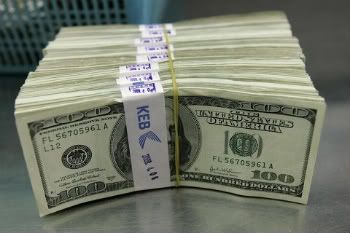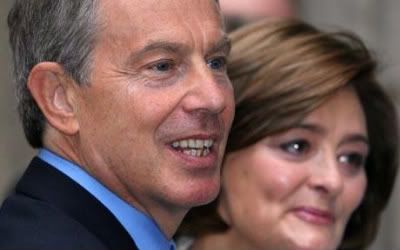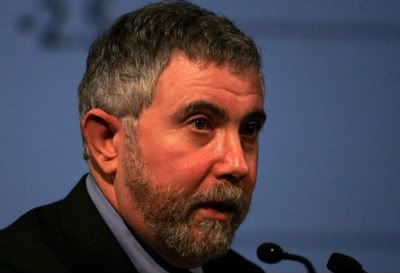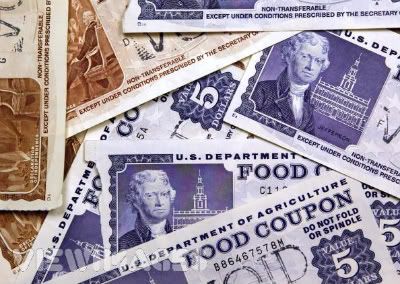Budget 2009: Now We Are All Up to Our Ears in ItTHE TELEGRAPH:
Alistair Darling's calamitous Budget not only consigned the nation to decades of debt, but also planted a poisonous legacy that will blight generations to come, says Jeff Randall."To preserve [the people's] independence, we must not let our rulers load us with perpetual debt. We must make our selection between economy and liberty, or profusion and servitude." – Thomas Jefferson, President of the United States of America,1801-1809.This week, Alistair Darling made a selection for us. His Budget for Bankruptcy banished economy and liberty. In their place, he delivered a profusion of unaffordable spending and a contract of servitude, not just for this generation, but for the next and the one after that. This is how independence is murdered. A ball-and-chain of spirit-sapping debt has been clamped to the nation's future. We are all serfs now.
In a speech of stunning torpidity (how does he manage it?), the Chancellor claimed: "You can grow your way out of recession, you can't cut your way out of it." Growth sounds attractive, an aspiration for solid citizens. Except the growth that Mr Darling had in mind was government borrowing, which is shooting up like bindweed on steroids, choking the economy.
His red numbers are so immense that most pocket calculators cannot accommodate them. Over the next five years – if all goes according to plan – Mr Darling will borrow £703,000,000,000. As the late Roy Castle used to say: "It's a record breaker!"
The United Kingdom is mired in debt, and the Chancellor's fiendishly clever escape route is, er, to borrow his way out of it. He's in a hole and digging furiously. Yet Gordon Brown, whose face is beginning to resemble a smacked bottom, was delighted by his cipher's performance. This style of presentation – straight from the Ceausescu handbook of statistics management – appeals to the Prime Minister's control-freakery.
It sounds complicated, but is surprisingly simple. You start with a politically desirable conclusion – in this case, the triumph of a suffocating state over personal responsibility, self-sufficiency and wealth-creating enterprise – and work backwards: cheating, lying, fiddling the numbers, until both sides of the balance sheet appear to be in harmony. This is how Labour operated its fraudulent boom. The same trick is being tried in a catastrophic bust.
>>> By Jeff Randall | Thursday, April 23, 2009
THE TELEGRAPH:
This Budget Will Make Us Pay for Britain's Excesses for Decades Now we must all pay for the wild excesses of an irresponsible minority, says Adrian Michaels.I wish I had known I was having such a good time. I will, according to the Budget, be paying for the country's excesses for decades. It is time to pull in the horns and tighten the belt. But wait. My belt doesn't have any more notches. I've been presented by Alistair Darling with the bill for a party I didn't attend.
For months now we have been hearing that it is bankers that brought the global economy to its knees through their irresponsible business practices, made possible by compliant and inattentive politicians and regulators. Meanwhile, people in financial services were paid far too much for their destructive corporate behaviour.
How much, exactly? In December 2007, 15 bankers – all men, of course – sat down for lunch at the Cap Horn, a mountain restaurant in the French ski resort of Courchevel. It was just turning dark when they paid the 28,000 euro bill. There were no prostitutes or drugs, I am informed, and the near-2,000 euros-a-head tab did not afford access to the President of the United States. No. The bankers were playing "Par One Hundred" – a drinking game in which the object would appear to be to vomit on your neighbour as fast as possible – with magnums of Krug champagne. The Cap Horn currently charges 850 euros for a magnum of 1997 Krug.
So what? "They're on a different planet," one friend said. That is the problem, however: bankers are not on a different planet, they are on exactly the same one as the rest of us. If they really were otherworldly, we could just forget about them and their lunches. But we all pay the price for their behaviour. The cheapest item on the Cap Horn's menu is cream cheese with salt and pepper at 13 euros. "Spaghetti
à la Bolognaise" is 25 euros.
So not only weren't we at the party that has just ended, the quality of our own lives was made worse by the fiesta's participants. Bankers made sure that we could not eat in the same restaurants as in the past, we could not take holidays in a growing range of destinations, and we could not live where we wanted. Ask the residents of Salcombe in Devon – "Chelsea-on-Sea" as it has become known – about the empty homes in winter and the fancy delis selling
porcini mushrooms instead of corner shops selling pints of milk and packets of Quavers.
>>> By Adrian Michaels | Thursday, April 23, 2009









